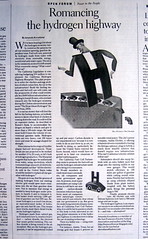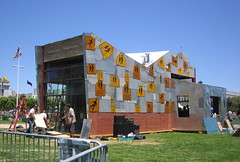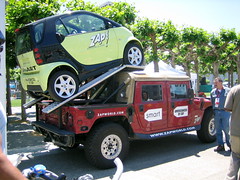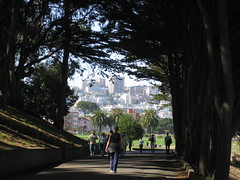When I heard that San Francisco was going to host the U.N. World Environment Day because our fair city was an example of good green living, I thought uh, oh we're in trouble. What about Amsterdam where the bicycle is king or any European city with their pedestrian friendly compact development? Even Manhattan was easier to get around without a car. And Chicago had one of the biggest green roof installations and an inner city farm. What did we have that was sustainable besides our wonderful queer friendly culture?
You never saw a city get green so fast. And it wasn't just the green glow emanating from city hall dome every night that week. On the civic center lawn was erected a house made from salvaged scrap, metal road signs and glass that was so stylish it was worthy of Dwell Magazine. The public was invited to tour examples of green buildings, attend lectures on water conservation, the future of mobility and the "not so big" house. There was a brand new film festival with a green focus.
At the Green Cities expo, you could see a public trash can which compacted the trash using solar power saving on pick-up trips. The EV booth showed off the Prius with the extra battery pack and the Bicycle Network gave test drives on their electric bicycles. I looked at samples of asphalt paving made from discarded tires and pledged to reduce my emissions with the Berkeley based Kyoto USA pledge. A Buddhist group from Taiwan displayed permeable paving stones to let water return to the earth and from Chicago, a slow windmill shaped like a helix that could be integrated into the architecture of a building or a sculpture garden.
The mayors from around the world were being transported to each event in brand new buses painted with colorful graphics advertising their clean emissions systems - natural gas, a hybrid and a fuel cell bus. It gave me a warm fuzzy feeling to imagine this international gathering of mayors convening just to talk about improving our quality of life as an urban dwelling species.
The Chronicle became an environmentalist's publication touting everything that was working - pesticide reduction on city land, an industrial size worm composting tea machine at the golf course. the largest urban solar panel installation on top of the Moscone center, green building standards, a green winery in Napa and a vision for the development of Treasure Island that brought tears to my eyes, so much was it in accord with my own vision of ideal of urban development. I wasn't alone in the yearning for better city living.
I'm a city girl. The country tires me out with its distances and space. When friends complain about the suburbs getting too congested, I secretly hope for more density. More density makes mass transit more affordable; living spaces must become smaller and less sprawling. There are more stores to give a neighborhood character. Mix use zoning begins to make sense. Public spaces can become vital centers of neighborhood interaction, people watching and communication. Cultural events have a place to happen. So when I think of an ecotopia it is not a back-to-the-land movement, but one of smart green development offering pedestrian pathways, bicycle accessible stores, small plot gardening, and civic pride.
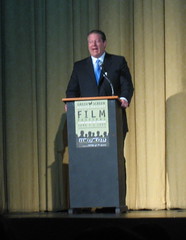
Pride was perhaps the most important outcome of being the first U.S. city to host this event. It was like the first Earth Day all over again. The ideas discussed will resonate for months, maybe years, I'm willing to bet. Al Gore came to town. I heard him twice. Once when he was speaking on the topic of global warming and that night at the Castro theatre showing an unexpectedly warm and visionary side as he introduced one of his favorite films - "The Real Dirt on Farmer John" (scheduled for a theatrical release in the fall. See it. It's an inspiring, heartwarming story of human cooperation.)
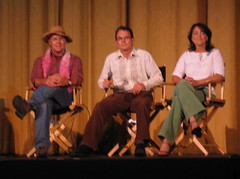 The Real Dirt on Farmer John
The Real Dirt on Farmer John
The moment Al entered the moderately full theatre and walked to his seat near the stage, people got up and applauded. His intelligence was such a welcome relief to He that has taken our country down a dark road, that for one brief and shining moment we could imagine Camelot. Alas, in these times, he seemed so idealistic.
Not to be outdone, Governor Schwarzenegger publicly announced that the debate about climate change was over and it was time to take action. I wanted to believe him, but our leaders have been in a sinkhole of corporate greed for too long now.
When legislation like NAFTA and now CAFTA could even be conceived by our leaders we were in trouble. Under NAFTA, foreign corporations have the right to sue our country and states should our health regulations and social justice regulations, indeed any regulation get in the way of corporate profit. Now with CAFTA (not yet passed), our own US corporations can sue us through their foreign subsidiaries and not just for cutting into their profit, but for threatening their expectation of profit, their fantasies of sugar plum fairies dancing in their heads profit; their penetrate every market profit, including overthrowing state regulations such as those governing how much recycled content our government's stationary should have. The cases would not even be tried in our own judicial system, but sent to a global tribunal that operates in secret. Talk about feeling powerless.
For a taste of that corporate attitude see the documentary Enron and listen to how California was manipulated and duped into paying through the nose for power when we had enough to export to other states. Similar tactics have been in use by corporations for decades to exploit peoples and resources of developing nations. Now even our own highly prized American citizenship will not protect us from such greed. And where is the blow-by-blow account of Enron's crime on prime time TV?
As my friend Martine says, it is an act of resistance just to stay informed.
When the man who introduced Al Gore at the Castro theatre spoke of government bringing about a better life, an audience member shouted out "you're a dreamer". We are a cynical lot it's true, so long have our dreams been dashed. But we are not asleep. There is something afoot.
At a panel discussion about the future of fuels and transportation, I listened to the director of the Institute of Transportation Studies at UC Davis, Daniel Sperling. The institute studies why people buy the cars that they do and though he could understand all the usual reasons such as wanting the latest technology, more power, and perceived safety, he was puzzled as to why people would pay more for a car, not because it saved money on fuel, but because it expressed their environmental ethics.
Hello! We're here. We will make choices based on our ethics since our industry leaders don't appear to be doing so.
At the green cities booth for the Post-carbon Solutions Group, I learned about an event with leaders from two seemingly disparate disciplines - my peak oil guy Richard Heinberg and Joanna Macy, a Buddhist who was also a deep ecologist. I attended the event, curious about what Joanna Macy had to say in the context of peak oil. I took my new friend Tian. I kept running into him at these events so why not car pool. This one was all the way over in a church in Oakland.
It turned out that Heinberg had been Macy's political guru for the last ten years. Their messages were similar. We have two choices - close down in fear, which would lead to panic and violence when oil became scarce. Or remain open and join in community to work through the crisis.
From her books, I knew that she felt our destructive industrial society needed to deteriorate considerably and "hit bottom" before enough people decided to change the way things worked. At the talk, she spoke of how changes were already happening that she hadn't expected to see in her lifetime.
Civilization had started with the agricultural revolution followed by the industrial revolution and now we would have the ecological revolution to bring about a sustainable society, she explained. This was the Great Turning that she wrote about in her books.
"The revolution is already beginning", she said in her grand ceremonial voice, "but it is going unreported. Those in power don't want the public to know about it". This didn't surprise us. It was evident to all of us in the room that the administration wished to continue with the war for oil until every last bit was under US control. We did not question what proof she had of this turning. We were believers because we ourselves were going in this direction and we could see our numbers were growing.
Richard Heinberg was also encouraging. "It only takes ten to twenty percent of the population knowing what is going on for the rest of the country to be okay", he told us. This low number startled me. It felt close. We could handle that. Many of us already had larger than average spheres of influence. Tian had his photo blog and sent information out to his e-list, while I did to mine. And others in the room looked like information peddlers too and/or role models of green living.
"The revolution will not be televised," said Joanna Macy evoking our Boomer history.
"It will be blogged," said my partner Catherine watching me type. Yeah, bloggers rule.
During the week of World Environment Day, it seemed possible that the eco revolution did exist, had surfaced briefly like a submarine, full of imaginative problem solvers. The 68 mayors came up with a nice list of green standards, all of which San Francisco already met. They flew home to their respective cities leaving us with a warm green feeling. Environmental issues were on the table again; this time at the more accountable local level of city policy making. The week had given us strength, reminded us of a common dream we could all could embrace.
Posted concurrently at Energy Bulletin
